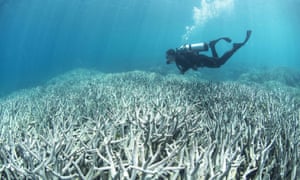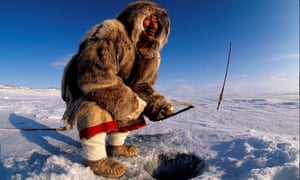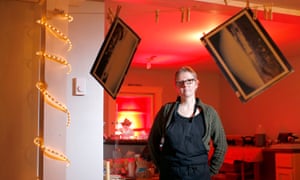Scientists reveal how they are dealing with a profound sense of loss as the climate emergency worsens
Melting glaciers, coral reef death, wildlife disappearance, landscape alteration, climate change: our environment is transforming rapidly, and many of us are experiencing a sense of profound loss. Now, the scientists whose work it is to monitor and document this extraordinary change are beginning to articulate the emotional tsunami sweeping over the field, which they’re naming “ecological grief”. Researchers are starting to form support groups online and at institutions, looking for spaces to share their feelings. I talked to some of those affected.

Steve Simpson
Professor of marine biology and global change at the University of Exeter
I studied marine biology 20 years ago, when it was a celebration of natural history. In the period of my career, it’s changed in front of our eyes. Every year, we went to Lizard Island, Australia, to a protected marine reserve in the Great Barrier Reef, and that was our reference for what coral reefs should be like: dazzling places, full of life. A quarter of all marine species live on coral reefs, which only make up about 0.1% of the ocean surface. They’re rainforests of the sea.
When we went back to the Great Barrier Reef after a major bleaching event in 2006, it had turned into a graveyard. It looked weird, because the fish were still brightly coloured, like someone had gone in and painted them on an otherwise black-and-white photograph. It was completely devastating to see individual corals that we knew and loved and had spent so long studying, now dead.
I’d just recruited a PhD student to study fish behaviour, and between the time of recruiting him and getting out for the first field season, the Great Barrier Reef died – 80% of the corals where we work were gone, and most of the fish that lived there also moved on. I told him in the interview that his visit was going to be this most wonderful experience, and it was just a tragic graveyard of historic coral reef life.
How have you been dealing with it?
We come back from our field seasons increasingly broken. You can either think: I can’t do this, I’m going to have to change the science I do; or you might try to internalise all of that pain that you feel. Lots of scientists do the latter – they feel we should be objective and robust, not at the mercy of our emotions.
Increasingly, we’re realising that we can use that emotional response to form new questions. Working on the bleached and dying coral reefs is enormously important to understanding how those environments are changing. There is a real urge to want to do something about it, rather than just chart the demise. And that’s where our research is heading now. We’re trying to restore some coral reef communities, or a fishery, or replant a mangrove forest. We’re just trying to find ways of protecting pockets of really diverse, vibrant life, which might reseed much larger areas when we tackle the big issues.
Any advice to others experiencing ecological grief?
It’s really important that we find ways of communicating the grief that we’re feeling and work together to support each other. Then we can become stronger, we can start to develop the science that takes our knowledge and turns it on its head – turns it into a solution, rather than just a negative story.
I think that finding any way of fostering a love of the natural world in the next generation is critical for them to be part of the solution.
Ashlee Consolo
What changes have you personally seen that have affected you?
Labrador is one of the fastest-warming places in Canada, with around three degrees temperature change since 1900. It’s a place that relies on solid ice formation, with deep cultural connections to cold. We interviewed hundreds of people on the coasts over five years, and no matter what age and gender, the changing environmental conditions were impacting them mentally, emotionally. Indigenous people talked about how being able to travel, to hunt, was freedom – a way of connecting to ancestors, culture, and feeling well and whole. With the climate shifting, people spend less time on the land, so they feel sad, angry, lonely and helpless.
A lot of people talked about grief for what it might mean for children and future generations to come. One of the Inuit elders said, “We are people of the sea ice. And if there’s no more sea ice, how do we be people of the sea ice?” And that sort of profound existential question is so deep and complex.
People talked about mourning their own identity, and also anticipatory grief: the sense that the changes are continuing, and that they’re likely to experience worsening of what they’re already seeing. People also discussed the sadness of watching others around the world suffer environmental-related trauma, and knowing the pain of what it’s like.
This is a slow and cumulative grief without end – unlike a human death, say. There’s not one moment that you can pinpoint, but long, enduring grief and anxiety that’s underneath.
How have you been dealing with it?
In doing this research, I did have a very long period where I almost felt consumed by what I was seeing in the environment, and also being surrounded by and immersed in the grief of others. When I was experiencing my own very severe ecological grief, one of the things that really helped me through was talking to the indigenous elders – having people to share with. It was a really amazing moment, because they talked about how grief isn’t something to avoid or be scared of. It’s certainly painful. It can be terribly isolating; it can be a really horrible experience. But if we come together, and we share our grief, and we share pain and emotions, there’s a real strength to that.
Any advice to others experiencing ecological grief?
There’s a power and an honour to grief, because it means that we have loved something, and we’ve had a connection to a place or to species of the planet. We need to find ways to mark our loss and share our loss, but also to remind ourselves that we only grieve what we love. I think new rituals are essential to celebrate that love, and to mark the loss and to come together for loss.
What I really learned from the elders was to start talking about grief as a totally normal response to climate change or other forms of environmental degradation. So it’s not something to feel ashamed about. And then through the leadership of those elders, they started bringing other people in the communities together to talk about what we were finding in research, and have people share their experiences.
The sense of helplessness is very prevalent – the feeling that the scale of our environmental crisis is so large that as individuals we can’t intervene. And I think that’s actually one of the really powerful mobilising potentials of ecological grief – it’s driving action and anger; climate marches. More and more people are coming forward to share their pain and there’s power in that – the capacity to make a sea-change in policy because ecological grief is so much now a part of the public narrative. Inuit leader Sheila Watt-Cloutier led a really amazing movement across Canada, bringing a lawsuit against the government for “the right to be cold”.
We’re seeing incredible leadership coming out of indigenous peoples’ elders, and part of what we have to talk about is: how do we deal with our grief? Because who and what we choose to grieve tells us a lot about ourselves and where our values are.
Deanna Witman
I was a field biologist, working for a private consulting company doing impact studies for transportation and infrastructure projects – collecting data to understand how the potential work would impact the surrounding area. Seeing these exceptional habitats being impacted had a deep subconscious effect on me.
I worked in that arena for almost 15 years and, at the same time, I was developing a sense of myself as an artist. I think that a lot of people, not just researchers, are experiencing this sense of loss and I think we’re still just trying to enunciate it. I found myself unable to move on and to create. And through a random conversation with somebody, I realised that I was experiencing grief.
It’s an existential sort of crisis if your world is being impacted. And I’m partly responsible for that. So there’s huge amounts of guilt involved along with the anxiety and the grief.
How have you been dealing with it?
Once I understood that I was grieving, it kickstarted my ability to make again. I live along a tidal river that’s experiencing the fastest-rising water temperatures in the world. So I decided to collect one of each plant species that I could find in a little patch of threatened intertidal marsh and photograph them using a gum-bichromate process. Through these images I was able to have a wider discussion about loss.
I’ve discovered that the art/creative process is my distraction. It doesn’t mean my grief goes away, but it’s a way for me to process it and to deal with it.
Any advice to others experiencing it?
I’ve been collaborating with a psychologist colleague who specialises in loss, and this past year we’ve produced a small brochure with my images and models from psychology that deal with grief, and it contains resources for people to turn to for additional help.
We’ve been travelling throughout Maine to hold community dialogue sessions to talk about ecological grief. And we’re having some great conversations – it’s pretty clear that people want to talk about it. Our hope is that people continue to meet with each other after our group talk.



No comments:
Post a Comment